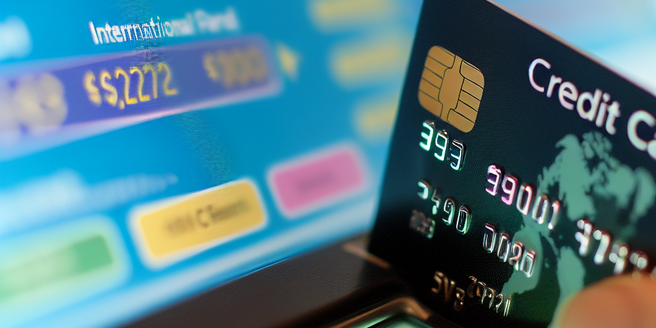Understanding Foreign Transaction Fees
| Transaction Fee Type | Typical Cost | Impact |
| Currency Conversion | 1-3% | Higher overall costs due to conversion rates. |
| Foreign Purchase | 1-3% | Additional cost on every international transaction. |
| ATM Withdrawal | Up to $5/transaction | Higher charges for cash withdrawals abroad. |
| Dynamic Currency Conversion | 3-5% | Merchant fee for converting currency on the spot. |
| Cross-Border Fee | 0.8-1% | Additional cost for transactions through foreign banks. |
| Exchange Rate Markup | Up to 3% | Banks adding their margin on top of exchange rates. |
Choosing the Right Card for Your Trip
Selecting the right credit card for international travel can significantly impact your trip’s overall expenses and convenience. Start by identifying cards that offer no foreign transaction fees. These cards save you the extra 1-3% charge on every overseas purchase. Also, consider cards that provide travel rewards or points which can be redeemed for flights or hotel stays, reducing your travel costs. Look for cards offering travel insurance and emergency assistance services. These additional benefits provide peace of mind, knowing you’re covered in case of unexpected events during your travels. Lastly, determine whether the card is widely accepted at your destination. Cards under major networks such as Visa or MasterCard tend to have broader acceptance globally. By carefully selecting a card that balances these factors, you ensure a smoother financial experience abroad.
Maximizing Rewards and Benefits Abroad
To truly maximize rewards and benefits while traveling abroad, familiarize yourself with your credit card’s reward structure and leverage it strategically. Use cards that offer greater rewards on travel-related expenses such as accommodation, transport, and dining. This approach allows you to accumulate points or miles quickly while tending to essential travel needs. Also, keep an eye out for limited-time offers or promotional categories which may offer increased points for specific expenses. Don’t forget to explore additional perks such as airport lounge access, travel concierge services, and exclusive travel offers, which your card might provide. These benefits add value beyond mere financial gains, enhancing your overall travel experience. Lastly, ensure all your travel-related spending is directed towards the card with the most favorable reward program, maximizing benefits from every penny spent abroad.
Preventing Fraud While Traveling
Preventing credit card fraud while traveling requires vigilance and preparedness. Start by notifying your bank or credit card issuer about your travel plans, including destinations and travel dates, to avoid unexpected service blocks. Set up alerts for all transactions or specify a threshold to monitor substantial expenditures. Such alerts can immediately notify you of unauthorized spending. Reduce risks by minimizing the number of cards you carry; only bring the essentials to avoid a wider exposure to loss. When using ATMs, choose reputable banks and ensure the machine hasn’t been tampered with to avoid card skimming. Keep a record of your card information, including customer service numbers, in a secure location separate from your cards. This precaution facilitates quick action if your card is lost or stolen.
Using Contactless Payments Overseas
Contactless payment methods are growing in popularity worldwide, providing travelers with a faster, more convenient way to complete transactions without the need for cash or physical contact. Before traveling, ensure your credit card is contactless-enabled and consider adding your card to mobile payment apps like Apple Pay or Google Wallet for additional convenience and security. Doing so allows you to tap and pay in places where contactless payment is accepted, sparing you the hassle of dealing with different currencies. Be aware of the local limits for contactless payments in your destination to avoid transaction problems. Although contactless payments are secure due to their encrypted transmission, it is sensible to keep security settings updated, including mobile locks and two-factor authentication, for mobile payment apps to prevent unauthorized use.
Minimizing Currency Conversion Costs
Currency conversion fees can erode the advantages of using credit cards internationally. To minimize these costs, opt for a card with no foreign transaction fees. Some credit card providers allow you to lock in exchange rates before your trip through prepaid travel cards, reducing the risk of unfavorable rate fluctuations during your travels. Where possible, always choose to complete transactions in the local currency rather than accepting dynamic currency conversion offers from merchants, since these often deploy unfavorable rates and additional fees. Additionally, monitor exchange rate trends before your trip to plan optimal currency exchanges or card uses. Staying informed about these conversion dynamics helps retain more of your travel funds for other expenses.
Leveraging Travel Insurance Perks
Credit card travel insurance perks offer travelers financial protection against unforeseen issues such as trip cancellations, delays, lost or delayed luggage, and accidents. Before your trip, review your credit card’s travel insurance offerings and understand their coverage limits, exclusions, and claim procedures. Many premium cards offer comprehensive insurance benefits at no additional cost, simplifying your travel insurance needs. In case of an incident, keep all required documentation such as receipts, medical reports, or police statements to support any claims you may need to file. Also, ensure you charge the full cost of the travel-related expenses on the card that offers the insurance benefit. Leveraging these insurance perks not only provides peace of mind but also protects you financially against substantial unplanned costs while abroad.
Managing Your Credit Card While Abroad
Effectively managing credit cards while traveling abroad ensures convenience and security in financial transactions. Start by setting up automatic bill payments to avoid missed payments and resultant late fees, which can affect your credit score adversely. Keep track of your spending to ensure you stay within your budget and avoid accruing high-interest debt. Consider using banking apps to monitor real-time transaction updates, making it easier to manage your account and spending from anywhere. Always carry a backup card in case your primary card faces issues, but keep it separate to avoid losing both in case of theft. Finally, store your bank’s international contact numbers in a safe, easily accessible place in case you encounter issues requiring immediate attention, such as a blocked or lost card.
Tips for Responsible Spending
Responsible spending ensures you enjoy your travels without the stress of returning home to overwhelming debt. Start by setting a realistic budget for daily expenses, factoring in accommodation, meals, transport, activities, and surprise costs. Use a travel-friendly card which offers rewards or cash-back on purchases, leveraging benefits as you spend. Avoid unnecessary splurging by prioritizing experiences or purchases unique to your destination. Keep track of your spending using budgeting apps linked to your credit card to facilitate real-time expense tracking. To manage cash flow, use the card wisely, reserving it for larger purchases and not routine expenditures that may lead to unanticipated debt accumulation. With conscious, deliberate spending decisions, you ensure memorable experiences while maintaining financial health.
How to Handle Lost or Stolen Cards
If your credit card is lost or stolen during your travels, act promptly to mitigate the impact. Immediately contact your bank or card issuer to report the loss and request a block on further transactions. Most issuers offer an emergency replacement service, delivering a new card to your location swiftly. To ensure you’re not held liable for fraudulent charges, document lost card reports and communications with your issuer. As a precaution, register for online account access before your trip to monitor transactions and enable alerts for any suspicious activity. Always store your card information securely; avoid writing down critical details openly or sharing them unnecessarily. Quick, knowledgeable action can help address the situation with minimal fallout, allowing you to continue your travels with as little disruption as possible.



